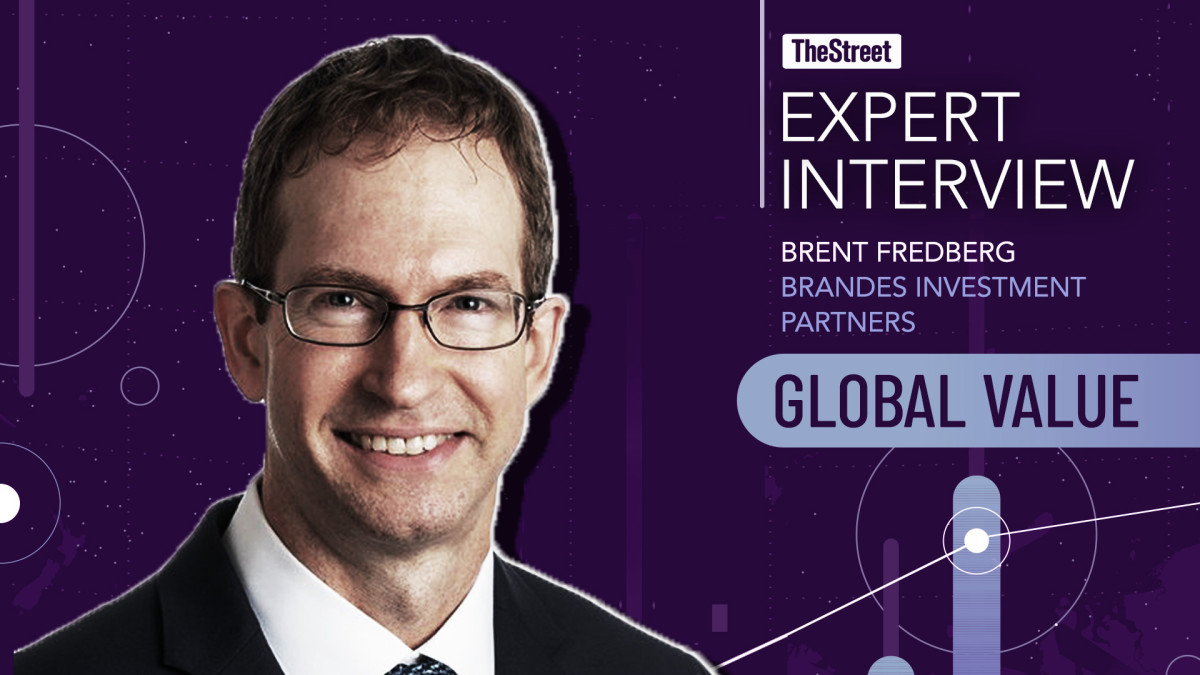
There’s an argument to be made for global funds: They enable fund managers to choose stocks from anywhere, and investors can widely diversify their portfolios.
We recently caught up with one such fund manager: Brent Fredberg of Brandes Global Equity (BGEAX) . The fund has $46 million of assets, and Brandes Investment Partners has $24 billion in total.

TheStreet/Brandes Investment Partners
Brandes Global Equity Fund’s performance
Brandes Global Equity Fund generated annualized total returns of 12% for the 12 months through Jan. 31, 11% for the past three years, 9% for the past five years, and 6% for the past 10 years, according to Morningstar.
Related: Veteran fund manager picks 3 top value stocks for 2024
Those numbers beat the Morningstar Global Value index for all but the 10-year period.
The fund is of the large-cap-value variety. In recent years, value stocks have underperformed growth stocks, making value an attractive play, Fredberg says. And low valuations overseas compared with U.S. stocks make foreign stocks appealing.
Here are his comments about those issues and more, including several stock picks.
TheStreet.com: What's your investment philosophy?
Fredberg: We’re fundamental value investors with a contrarian bias. We don’t define value as simply low multiples. We take growth, quality, and moats into account when establishing a company’s intrinsic value.
More Wall Street Analysts:
- Analyst who correctly warned Tesla stock could fall unveils new target
- Fund manager of $2 billion portfolio unveils 9 favorite stocks
- Analysts unveil new stock price target for Nvidia ahead of earnings
We are able to assemble a portfolio of well-positioned businesses that are significantly cheaper than the market overall.
Oftentimes, discounts arise because a company is suffering from something, and we take a view as to whether the issue is short-term and fixable or whether it is something that is longer-term and secular.
The market is very focused on what it can see in the near term. But when you invest in companies over a multiyear period, what appears to be influential today may no longer be in the headlines three to five years from now.
TheStreet.com: What’s the attraction of global large-cap value stocks?
Fredberg: Value stocks are extremely cheap relative to growth stocks. Global value stocks are cheaper relative to growth stocks than they’ve been in several decades other than the Nifty Fifty period of the late 1960s and early ‘70s and the tech bubble of the late ‘90s.
Historically, when value stocks have become this cheap relative to growth stocks and relative to the market, it’s resulted in strong outperformance for value stocks over the subsequent five or more years.
Also, while we’re finding individual opportunities in the U.S., overseas markets are significantly cheaper relative to the U.S. than normal.
A common pushback is that international markets are less weighted in technology stocks, which is true. But they’re significantly cheaper than normal, even adjusting for that. And international earnings are more depressed.
Global value stocks also provide diversification to the very concentrated U.S. market and its Magnificent Seven [Alphabet, Amazon, Apple, Meta Platforms, Microsoft, Nvidia, and Tesla].
TheStreet.com: Are there particular industries or themes in the markets that you like?
Fredberg: In 2022, we bought technology companies when tech was out of favor. At that point, we also trimmed some of our health-care holdings, as they were outperforming.
More recently, we’ve been doing a little of the opposite. We think tech is quite fully valued as a sector. However, the sector is bifurcated. We’re still able to find ways to participate in the artificial intelligence theme through lower-profile companies that are quite cheaper.
We also like health care. We see it as a defensive sector that is still offering quite a few attractively valued names. It’s not just pharmaceutical companies but also healthcare services and medical equipment companies.
TheStreet.com: Are there any geographies you particularly like?
Fredberg: Emerging markets look more attractive. China went from much-loved five years ago to much-avoided today. We think the sentiment was too extreme in both cases.
China is influencing many other emerging markets today, suppressing valuations. But it’s very important to be selective.
We like South Korea. They’ve seen how successful Japan has been with its focus on improving the profitability of laggard companies, optimizing balance sheets, and focusing more on shareholder returns.
South Korea is looking to emulate some of that and eliminate the so-called Korean Discount that has existed for years. We’ll see how serious they are, but we own a number of companies there that could benefit.
In Europe, there are a number of well-positioned multinational companies that just happen to be domiciled in Europe but generate their revenue across the world. And they trade at significant discounts to their U.S.-headquartered peers.
TheStreet.com: Can you speak about three of your favorite stocks?
Fredberg:
1. Sanofi (SNY) , the big French drug company that does business around the world. It has one of the lowest patent risks among major drug companies, with no big expiration until 2030.
It is led by the immunology drug Dupixent. Sanofi is also very strong in vaccines, which are cash-flow generators. In addition, it has a multiple-sclerosis drug in trials that could add to growth.
And it plans to spin off or sell its consumer business later this year. That includes Allegra and Aspercreme.
2. FedEx (FDX) . As you know, it’s one of the two leading-package delivery companies, along with UPS (UPS) . The oligopoly nature of the industry should allow for pricing power.
FedEx has been operating inefficiently relative to UPS, with operating margins significantly below those of UPS. In 2022, FedEx appointed a new CEO, who has been cutting costs, focusing on free cash flow, and emphasizing a better-not-bigger approach to improve margins.
FedEx is going to integrate its ground and express business, which could materially improve efficiency and profitability.
3. Taiwan Semiconductor (TSM) , the world’s largest semiconductor foundry. It makes all of Nvidia’s leading-edge AI chips, as well most of the chips that drive the cloud.
The company saw revenue drop 5% last year, the first decline in over a decade. More than half its business comes from smartphones and personal computers, which experienced a lull last year.
However, both of those markets look to be improving. And over the next couple of years AI will move onto smartphones and PCs, increasing the need for semiconductor content.
Related: Veteran fund manager picks favorite stocks for 2024







